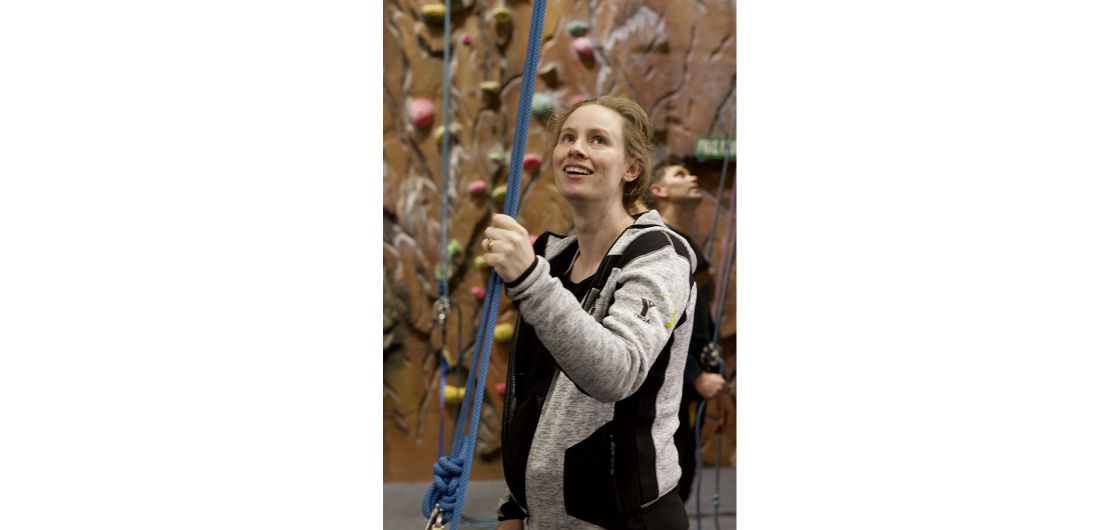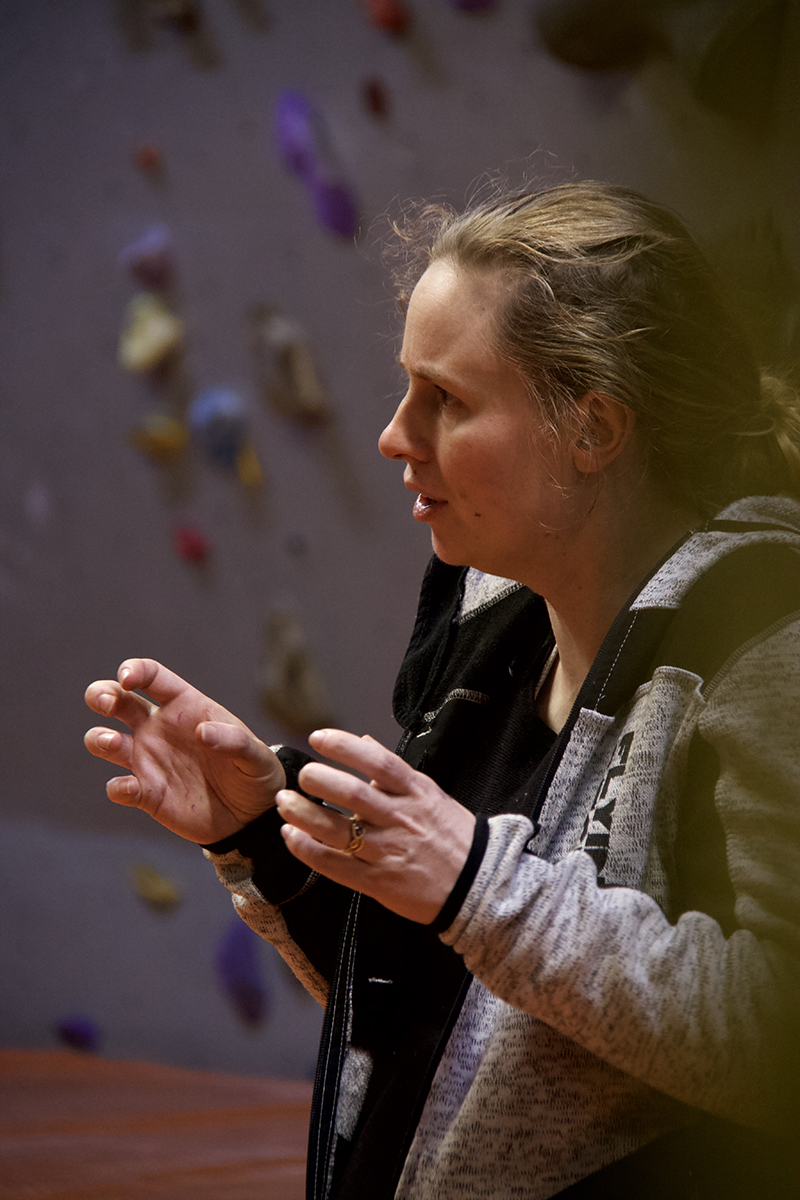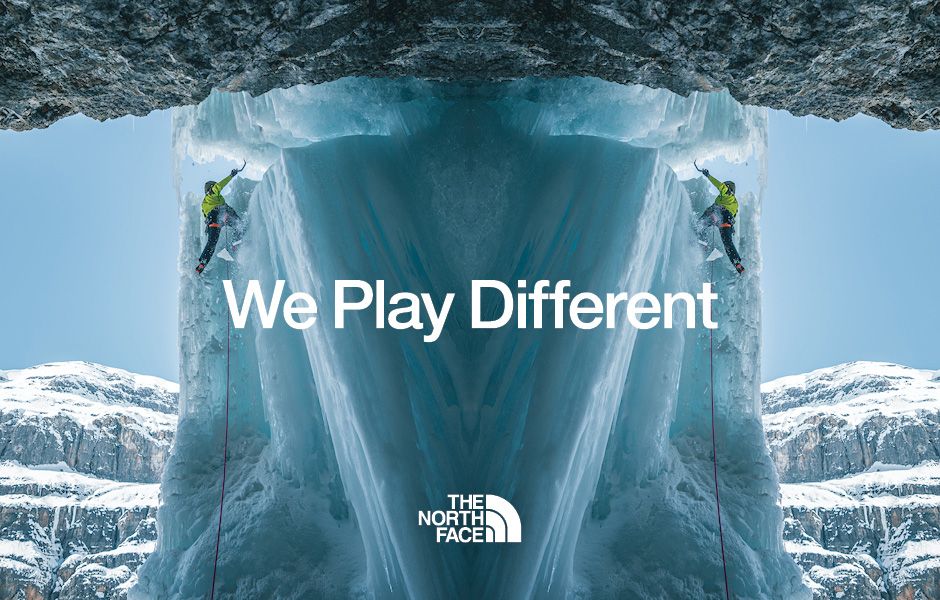
An Interview With Volunteer Climbing Coach Rowan Hodgkinson
By Rachel Musgrave
Photo by Christina Rivett
Readers who climb regularly at the YMCA Adventure Centre in Christchurch will have come across the Flying Geckos Climbing Club. Rowan Hodgkinson has been a regular fixture as head coach for the last 11 years, three nights a week, a position that until recently was entirely as a very dedicated and enthusiastic volunteer. In the latter half of this year, Rowan is taking a step back from her coaching position, so I thought it would be a good opportunity to catch up with her about some of her insights into coaching youth climbing in Aotearoa.
Rach - You have just finished a coaching session with the Flying Geckos. Tell me about your squads and what you have been doing with them tonight.
Rowan - Tonight, we had the junior and senior training teams, the social seniors, and the black and silver squads. They warm up together and do conditioning at the end. I’ve been working with the silver squad tonight, focusing on endurance climbing and fall practice because they were nervous on lead at the start of the year—we are working on falling safety for the belayer and climber.
Rach - When coaching climbing, how do you balance the differences between kids and young adults who want to compete, and those for whom participation and social connection is the most important thing?
Rowan - We use a pathways method—members can pull in and out of a pathway as they chose. It’s set up so a kid can be a general club member who can come one night a week (or more), even if they are mostly a social climber. They choose the level of training they are doing. We put them in groups that suit their level of training and so they have a training group to be connected to.
Rach - Do you find that this pathway system means there is less burn out with the comp scene?
Rowan - Yes. We like comps, they teach the kids to set goals, but there are many pathways they can chose to do this. Some are really interested in climbing outdoors, so there is a group of parents and volunteers who take them regularly. We are aiming to develop lifelong climbers.
Rach - Over the years you have coached some young climbers who have gone on to participate at elite levels in their chosen disciplines of bouldering, rock climbing and even mountaineering. Do you remember if they had any attributes that made them stand out as young climbers?
Rowan - They made solid training partnerships, they enjoyed themselves and had the discipline. But mostly, they just REALLY, REALLY WANTED to do it.
Rach - So do you think that that is all that it takes to excel at climbing—being super motivated?
Rowan - It depends on the situation … we look at long term athlete development, that’s why we take their measurements and track growth changes through time. It goes in ebbs and flows. If they start climbing before puberty, they have years to develop skills and technique. Then, at puberty, when we start to train strength and power, those who have started climbing at a young age often progress at a faster rate in the end.

Rach - One observation I have made is that at younger ages girls and boys are represented in equal proportions climbing in Aotearoa, but as they get older, participation from girls decreases, resulting in fewer numbers of females continuing climbing as adults … do you agree with this and if so, why do you think the girls give up and the boys stick at it?
Rowan - Did you see my group of girls tonight?
Rach - Yes, I’ve seen them! The silver squad is awesome, they are crushing, I’ve seen some of them outdoors too—they seem to climb and train so well together! Are they an anomaly, or is it something you have done?
Rowan - This year the silver squad is all girls, it’s great, we’ve been really working on the girls for years now. We split them off during covid because we had to limit the numbers, so now they have their social group and it’s kept going—I’m used to the big groups of boys, but this year it was the boys who dropped out because they were all late developers and they were getting disappointed by their comp results (which were mostly due to their height).
Rach - What could be done to encourage youths of all genders to continue climbing into adult life?
Rowan - When they switch into the adult world there is no structure for climbing. Adult females especially (for the most part) seem to need a group to go with other adult female friends who want to climb, so they have the social connection. They need to plan for it, otherwise climbing falls by the wayside. Apart from the Canterbury University Climbing Club, we don’t have a continuation for 17–22-year-olds.
It’s also about focusing on long term athlete development. Checking where the growth status is and finding the right time to progress what will benefit them the most: by increasing the training workload and developing muscle strength and power, as opposed to skills and technique. This applies to girls and boys.
Rach - Do you coach any other sports?
Rowan - I actually started coaching athletics first. When I was 12 years old, I coached the 5-year-olds at my athletics club. I started coaching climbing here at the YMCA aged 14. I still coach swimming. I have a group of Muslim women at the moment. We close off part of the pool so it’s completely private and I am teaching them to swim. Some of them have never seen water in a pool like that before. I love it and I don’t want to give it up.
Rach - What made you interested in coaching sport in the first place? Why do you like it?
Rowan - It just sort of evolved! As a kid I tried to explain things lots of different ways to people to try and find the best way to communicate. Part of the interest in coaching was exploring how to use those skills to pass on messages, finding the best way to explain things and what is the best way for me to teach for them to learn. I struggle with communication myself so passed it back—that’s how my communication skills developed by trying to figure out how other peoples’ brains work.
I was a considered a hyperactive child, so my parents sent me do sport every night to counter that. I did so many sports it’s not funny—surf lifesaving, athletics, hockey, swimming, Irish dancing, jazz dancing, gymnastics. Mum was a preschool teacher at the time, so I was hanging out with kids all the time.
Rach - I know that you also did climbing, because I coached you here when you were in the Flying Geckos. I remember that often you would turn up having already done swim and athletics training earlier that day. You were (and still are) a machine!
Rowan - I started climbing when I was 12, it was one of the last sports that I tried.
Rach - Do you have any sport coaching qualifications?
Rowan – Most of one … I tried the University of Canterbury Sport Coaching Degree for a few years, but I didn’t finish. I found the course at the time was very much based on leadership and team coaching and I got bored quickly. But I really liked the sport science classes and I still collect and read all the new university textbooks for those subjects every year.
Rach - What has been the most rewarding thing for you about coaching climbing?
Rowan - When the kids start to develop confidence—especially if they were a kid that didn’t have much confidence at the start.
Rach - Was there anything else that you would like to say?
Rowan - We always like more coaches to volunteer, they are the life of the club.
